
The Benefits of Collagen for Gut Health: IBS, IBD, Crohn's, Colitis
Collagen for Gut Health Benefits
Are you struggling with gut health issues and you don't know what to do? Maybe you've tried many different things, but nothing seems to work.
Many people suffer from digestive issues such as irritable bowel syndrome (IBS), inflammatory bowel disease (IBD), Crohn's disease and colitis. These conditions can be very debilitating and make it difficult to live a normal life.
Collagen is a protein that is found in the connective tissues of the body. It has many benefits for gut health, including reducing inflammation, improving digestion, and healing the lining of the gut.
In this article, I delve into all aspects of collagen for gut health by looking into the extensive research to uncover the benefits that collagen can bring to your digestive system. We'll navigate the guidelines for using collagen effectively, ensuring you make informed decisions on type, dosage and routine.
Get ready to revolutionize your gut health and discover the extraordinary possibilities that collagen offers.
Before we get started, I want to mention that the single best source of collagen to heal your gut is high protein bone broth. Bluebird Provisions chicken is the highest quality choice with 10 grams per cup, plus it tastes absolutely delicious.
Alright, let's get into it.
Benefits of Collagen for Gut Health
Collagen has a vast range of benefits throughout your body, but it really shines when it comes to gut health. The benefits of collagen for gut health include maintaining you gut lining, improving bloating symptoms, reducing inflammation, helping you absorb food and laying down new tissue in your intestines.
Let's go through each of these in more detail.
1. Helps to maintain gut lining health and integrity
Your gut lining is a single layer of cells that acts as a protective barrier between your digestive tract and the rest of your body. This barrier is crucial for preventing harmful substances from entering the bloodstream.
Collagen contains specific amino acids, such as glycine and proline, which are essential for the formation and repair of this lining. These amino acids help strengthen the gut barrier, reducing the risk of gut permeability or leaky gut syndrome.
Incorporating collagen into your diet supports the health of your gut lining. This can contribute to better overall gut health and ensure that the barrier functions optimally, preventing food particles from passing through and causing inflammation or other digestive issues.

2. Improve gut symptoms, bloating and constipation
Collagen contains specific amino acids, such as glutamine, which can help soothe and repair the intestinal lining. By supporting the health of the gut lining, collagen reduces inflammation and discomfort in your gut, which can alleviate bloating.
According to an article published in JMIR Formative Research in 2022, women who took collagen experienced a significant reduction in digestive symptoms, including bloating (1).
That's not all it's good for. Collagen is also shown to promote healthy digestion and regular bowel movements. It aids in the breakdown of food and enhances the absorption of nutrients.
This improved digestion helps prevent the buildup of gas and alleviates bloating. The ability of collagen to reduce bloating is one of the key reasons that collagen is used for pregnancy.
The amino acids found in collagen support the movement of food through our digestive tracts and promote bowel regularity. By improving intestinal transit, collagen helps relieve constipation and promotes a healthy and regular digestive system.
Sometimes when I have digestive issues or constipation, I'll take some collagen for a few days and it seems to settle my digestive system an get it back on track.
3. Amino acids to reduce inflammation
One of the most surprising things I learned when I delved into my research on collagen is that specific amino acids found in collagen, such as glycine, proline and glutamine, have anti-inflammatory properties.
Anti-inflammatories are such a buzz word right now, but who knew collagen was loaded with them? It makes sense when I think about it, since collagen is so great for skin, and I know that skin beauty has a lot to do with inflammation.
These amino acids work together to reduce inflammation in the gut and promote a healthier environment for digestion. A study published in The FASEB Journal in 2023 found that inflammation causes gut integrity dysregulation and negatively affects microbiome function (2).
Inflammation in the gut can occur due to various factors, including a poor diet, stress or certain medical conditions. Chronic inflammation in the gut can lead to discomfort, bloating and other digestive issues.
4. Improves digestion and absorption of food
In my extensive research on collagen, I discovered that it supports digestion by aiding in the breakdown of food and enhancing nutrient absorption. However, I was personally surprised by how it made me lose weight!
I shouldn’t have been surprised. According to an article published in MDPI in 2023, collagen peptide exerts an anti-obesity effect (3).
Collagen contains specific amino acids, glycine, proline and glutamine, which promote a healthy digestive system. The best collagen powder for weight loss are full of these amino acids to aid digestion and enable less fat storage.
How does this work? Collagen works by stimulating the production of gastric juices, which aids in the breakdown of food and facilitates the absorption of nutrients. This improved digestion can lead to reduced bloating, better nutrient absorption and overall enhanced gut function.
Also, collagen is a rich source of amino acids, which are the building blocks of protein. These amino acids assist in the digestion and utilization of dietary proteins, ensuring that our bodies can benefit from the essential amino acids found in proteins.
5. To increase gut mucosal lining thickness
During my research on collagen, I discovered that the gut mucosal lining plays perhaps the most crucial role in protecting the gut and promoting optimal digestion.
I always think about what goes into the stomach as being the most important element in digestion, but in fact, the mucous lining matters more.

The mucosal lining acts as a barrier, preventing harmful substances from entering the bloodstream and maintaining a healthy gut environment.
These same amino acids I keep mentioning (glycine and proline), are essential for the formation and repair of tissues, including your gut mucosal lining. When these amino acids are incorporated into the diet through collagen consumption, they can support the production and synthesis of collagen in the body.
Increasing collagen levels can lead to an increase in the thickness of the gut mucosal lining. This thicker lining provides better protection against gut permeability or "leaky gut," where harmful substances can pass through the gut lining and cause inflammation and other digestive issues.
Learn about which foods are highest in collagen to get started today.
How to use collagen for gut health?
There are a few important steps you need to follow when using collagen for gut health, including selecting the right type, adding it to your routine, getting the right dose and measuring your results.
Step 1: Select the right type of collagen
Choose a high-quality collagen supplement specifically formulated for gut health. Look for collagen types known to support gut lining health, such as type I and type III collagen.
According to a study published in the Journal of Dietary Supplements in 20222, there’s a lot of variation in collagen products available (4), so do your research and choose a quality product that can improve your gut health. Whole food sources of collagen like bone broth are a great way to get a balanced, natural source of collagen.
If you want a specific product recommendation, read my guide which ranks the best collagen supplements.
Step 2: Add collagen supplements to your routine
Incorporate collagen into your daily routine in one of the following ways:
- Collagen powder: Mix the recommended dosage of collagen powder into your preferred beverages, such as coffee, tea, smoothies or water. Stir well to ensure thorough mixing.
- Collagen capsules: Take collagen capsules with water as directed on the product label. Follow the recommended dosage provided by the manufacturer.
- Dietary collagen: Incorporate into your daily diet with bone broth, gelatin desserts, chicken wings, etc.
Step 3: Select the right dose
Determine the appropriate dosage of collagen based on the recommendations provided by the manufacturer or consult with a healthcare professional for personalized advice.
|
Daily Dose of Collagen |
Best Used For |
|
5 grams |
Starting dose for general health maintenance and supplementation. Suitable for those who are new to collagen supplementation or using it for bone health. |
|
10 grams |
Good for individuals looking to boost skin health and improve joint function. This is a moderate dose that can balance the benefits without overwhelming the system. |
|
15 grams |
This dose can be useful for individuals with more serious health concerns, such as those looking to support gut health. This amount is suggested after gradually increasing from smaller dosages. |
|
20 grams |
Recommended by practitioners for reducing digestive symptoms such as bloating, stomach cramps, and irregular bowel movements. Notable effects observed after 6 weeks of daily intake. This is also the most common dosage prescribed by dietitians for their patients. |
Dosage recommendations may vary depending on individual needs and specific gut health concerns. While it’s unlikely for even a high dose of collagen to be bad for you, it’s best to start slowly and within doctor recommendations.
Step 4: Give it time for results to show
Allow sufficient time for the collagen to work and for potential improvements in gut health to occur. Consistency is key, so incorporate collagen into your routine on a daily basis. Results may vary and it may take some time to notice significant changes in gut symptoms or overall gut health.
It took months for my digestion to start turning around when I started drinking bone broth to get my collagen. Now, a few years later, I can eat all of the foods that used to leave me bloated and gassy.
Step 5: Follow up with a doctor if required
If you have specific gut health concerns or medical conditions, it's important to consult with a healthcare professional, such as a doctor or registered dietitian. They can provide personalized guidance, monitor your progress and make any necessary adjustments to your collagen supplementation or overall treatment plan.

I love to help but sometimes you need real medical attention or the guidance of a professional.
What types of collagen are best for gut health?
For gut health, two types of collagen are considered to be particularly beneficial:
- Type I Collagen: Type I collagen is the most abundant collagen type in your body and plays a crucial role in the formation and maintenance of your gut lining. It provides structural support to the gut mucosal lining, helping to maintain its integrity and function.
- Type III Collagen: Type III collagen is another important collagen type found in our gut lining. It works in conjunction with type I collagen to provide strength and elasticity to the gut mucosa. Type III collagen is involved in tissue repair and regeneration, which is essential for maintaining a healthy gut lining.
|
Collagen Type |
Location in Body |
Primary Functions |
|
Type I |
Skin, bones, ligaments, tendons |
This is the most common and most abundant type of collagen in the body, making up about 90% of the body's collagen. It is crucial for providing structure to the skin and strength to bones, ligaments, and tendons. It is also beneficial for gut health. |
|
Type II |
Elastic cartilage, especially joints |
This type of collagen is primarily found in elastic cartilage and is critical for joint health. It can be found in intervertebral discs serving as spine's shock absorbers and is often used in supplements aimed at joint health. |
|
Type III |
Muscles, arteries, organs |
Type III collagen plays an integral role in the structure of muscles, arteries, and various organs. It is the primary component of reticular fibers, found in the skin and blood vessels. It also assists in the health of other tissues and organs. |
|
Type IV |
Skin layers, kidneys, inner ear, and eye lens |
Type IV collagen helps form tissues within the digestive system, thereby supporting gut health. It also plays a role in the health and functioning of kidneys, inner ear, and eye lens. |
|
Type IV |
Skin layers, kidneys, inner ear, and eye lens |
Type IV collagen helps form tissues within the digestive system, thereby supporting gut health. It also plays a role in the health and functioning of kidneys, inner ear, and eye lens. |
When selecting a collagen supplement for gut health, look for products that explicitly mention type I and type III collagen or specify their benefits for gut health. It's important to choose high-quality collagen supplements from reputable brands to ensure you're getting a reliable and effective product.
A study published in J. Agric. Food Chem in 2022 found that food-derived bioactive collagen peptides in fish were beneficial for probiotics (5), so it may be worth looking into a marine source of collagen for gut health if you don’t mind the taste.
How much collagen should be taken to improve gut health?
The recommended dosage of collagen for improving gut health can vary depending on individual needs, specific gut health concerns and the brand or product you are using. A common dosage range for collagen supplements is around 10-20 grams per day.
Since there’s no one-size-fits-all answer, here are some general guidelines to consider:
- Carefully read and follow the recommended dosage instructions provided by the manufacturer of the collagen supplement you are using. Each supplement is different, so check labels carefully.
- Start with a lower dosage: If you're new to collagen supplementation, it's recommended to start with a lower dosage and gradually increase it if needed. This allows your body to adjust and helps you gauge your individual response to collagen.
- Consider specific gut health concerns: If you have specific gut health concerns, such as gut permeability or digestive issues, it may be beneficial to consult with a healthcare professional who can provide tailored guidance on the appropriate dosage of collagen for your condition.
How does collagen help to reduce inflammation in the gut?
Collagen contains specific amino acids that have been associated with anti-inflammatory effects, such as glycine, proline and glutamine. These amino acids play a role in modulating the immune response and reducing inflammatory processes in the body, including the gut.
Also, collagen supports the health and integrity of our gut lining. The gut lining acts as a barrier between the contents of the digestive tract and the bloodstream. When the gut lining is compromised, it can lead to increased inflammation in the gut.
Collagen helps to strengthen and repair the gut lining, reducing gut permeability or "leaky gut" and limiting the passage of harmful substances that can trigger inflammation.
What other nutrients are important for gut health?
In addition to collagen, several other nutrients play a vital role in supporting gut health. They act like a collagen booster, intensifying the positive effects of collagen in your body. Here are some key nutrients to consider:

- Fiber: Adequate fiber intake is crucial for a healthy gut. Fiber acts as a prebiotic, providing nourishment for beneficial gut bacteria. It helps promote regular bowel movements, supports the growth of beneficial bacteria and aids in the overall balance of the gut microbiome. Good sources of fiber include fruits, vegetables, whole grains, legumes and nuts.
- Probiotics: Probiotics are beneficial bacteria that can help improve gut health. They support a healthy balance of gut microbiota, aid in digestion and strengthen the gut barrier. Probiotics can be found in fermented foods like yogurt, kefir, sauerkraut, kimchi and certain supplements.
- Omega-3 fatty acids: Omega-3 fatty acids, particularly EPA and DHA, have anti-inflammatory properties that can benefit gut health. They help reduce inflammation in the gut and support a healthy gut lining. Good sources of omega-3 fatty acids include fatty fish like salmon, sardines and mackerel, as well as flaxseeds, chia seeds and walnuts.
- Vitamin D: Vitamin D plays a role in immune function and can help modulate inflammation in the gut. It may support a healthy gut microbiome and help maintain gut barrier integrity. Sunlight exposure, fortified foods and certain fatty fish are sources of vitamin D.
- Zinc: Zinc is an essential mineral that plays a role in gut integrity, immune function and wound healing. It supports the repair and maintenance of the gut lining. Good sources of zinc include meat, shellfish, legumes, seeds and nuts.
- Antioxidants: Antioxidants, such as vitamins A, C and E, help reduce oxidative stress in the gut and protect against inflammation. They can be found in various fruits, vegetables, nuts and seeds.
- Glutamine: Glutamine is an amino acid that supports gut barrier function and helps maintain the integrity of the gut lining. It is naturally present in protein-rich foods like meat, poultry, dairy, legumes and spinach.
A well-rounded, balanced diet rich in whole foods is generally the best approach to obtain a wide range of nutrients that support gut health. Be sure to eat a diet rich in foods that have a lot of collagen. Bone broth is my go-to for this, and the one from Bluebird Provisions has all the collagen you need.
How does collagen affect the microbiome of the gut?
The exact effects of collagen on the gut microbiome are still an area of ongoing research. However, some studies suggest that collagen may have indirect effects on the gut microbiome through its impact on gut health and the gut barrier.
Collagen helps maintain the integrity of your gut lining, acting as a protective barrier between the gut and the bloodstream. By supporting the gut barrier, collagen may indirectly influence the gut microbiome by preventing the translocation of harmful bacteria or toxins.
Chronic inflammation in the gut can disrupt the balance of the microbiome, leading to die off of beneficial bacteria. By reducing gut inflammation, collagen may create a more favorable environment for a healthy and diverse gut microbiome.
Finally, while collagen itself is not considered a prebiotic, it is full of healing amino acids, which can serve as a source of nutrition for certain beneficial gut bacteria. These bacteria can utilize these amino acids and potentially contribute to a healthier gut microbiome.
How can collagen help with gut health conditions such as IBS, IBD, Crohn’s and Colitis?
Collagen may offer potential benefits if you're suffering from gut health conditions such as irritable bowel syndrome (IBS), inflammatory bowel disease (IBD), Crohn's disease and ulcerative colitis. While collagen is not a cure for these conditions, it may help alleviate symptoms and support overall gut health.
Collagen plays a crucial role in maintaining the health and integrity of the gut lining. This is particularly relevant for gut conditions where the gut lining may be compromised, such as in IBD and IBS. By strengthening the gut barrier, collagen may help reduce gut permeability, preventing harmful substances from entering the bloodstream and triggering inflammation.
Amino acids in collagen, glycine and proline, have potent anti-inflammatory properties. These amino acids may help modulate the inflammatory response in the gut, potentially reducing inflammation associated with IBD, Crohn's disease and ulcerative colitis.
There is even a 2022 study that used a high collagen bone broth to treat ulcerative colitis (6).
Collagen supports digestion and enhances nutrient absorption, which can be beneficial for individuals with gut health conditions. Improved digestion may help alleviate symptoms such as bloating and constipation, while enhanced nutrient absorption can support overall well-being.
Closing Thoughts
If you’re struggling with gut issues, collagen is a nutrient you should seriously consider adding to your diet. It can help improve digestion, reduce inflammation, and ease the symptoms of IBS, IBD, Crohn’s, and colitis.
And what better way to get collagen than from a delicious bone broth? I recommend Bluebird Provisions, which you can find on Amazon Prime for free shipping.
Have you tried using collagen for bone broth to heal your gut? How did it go? Leave a comment and let me now. Or if you have any questions, leave a comment and I will get back to you asap.
Sources
- https://pubmed.ncbi.nlm.nih.gov/35639457/
- https://www.ncbi.nlm.nih.gov/pmc/articles/PMC10107696/
- https://www.mdpi.com/2072-6643/15/11/2610
- https://www.tandfonline.com/doi/full/10.1080/19390211.2021.1931621
- https://pubs.acs.org/doi/abs/10.1021/acs.jafc.2c01251
- https://www.ncbi.nlm.nih.gov/pmc/articles/PMC8618064/
Disclaimer: this information is for educational purposes only and has not been evaluated by the FDA or CFIA. It is not intended to diagnose, treat, cure, or prevent any disease or healthcare issue. Please consult your primary care physician for advise on any of this.
Bluebird Provisions is reader-supported. When you buy through links on our site, we may earn an affiliate commission. As an Amazon Associate, we earn from qualifying purchases.

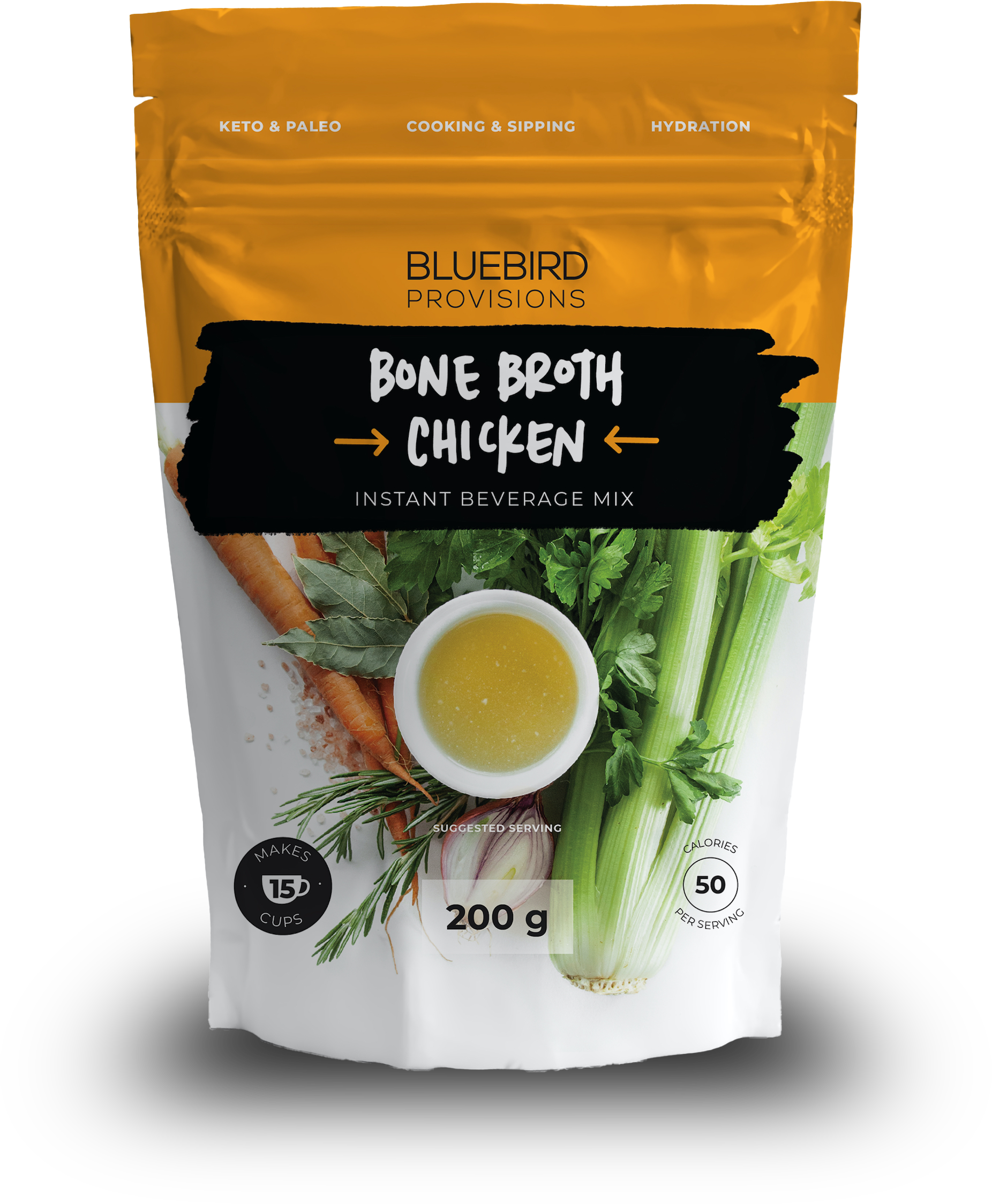
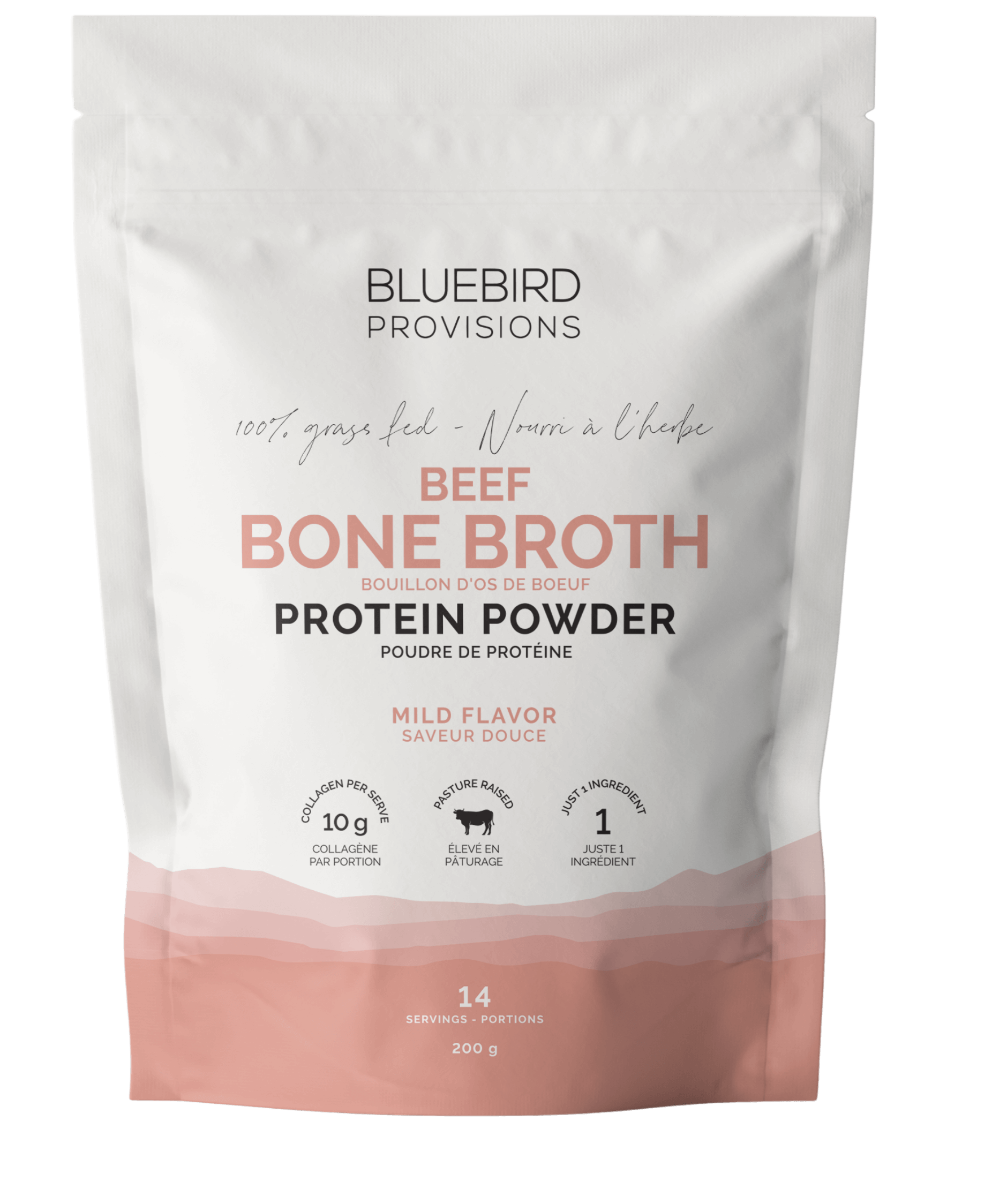

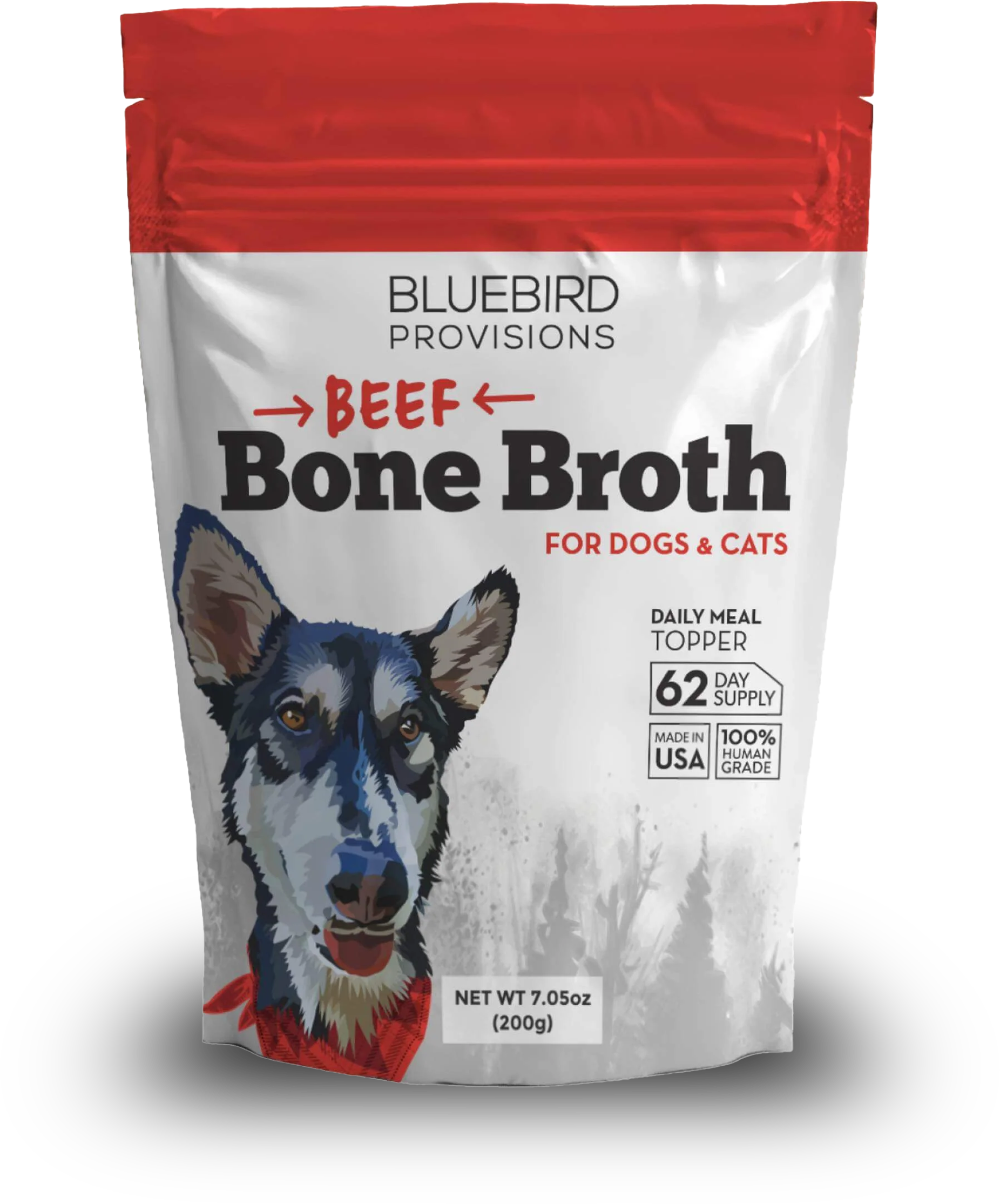

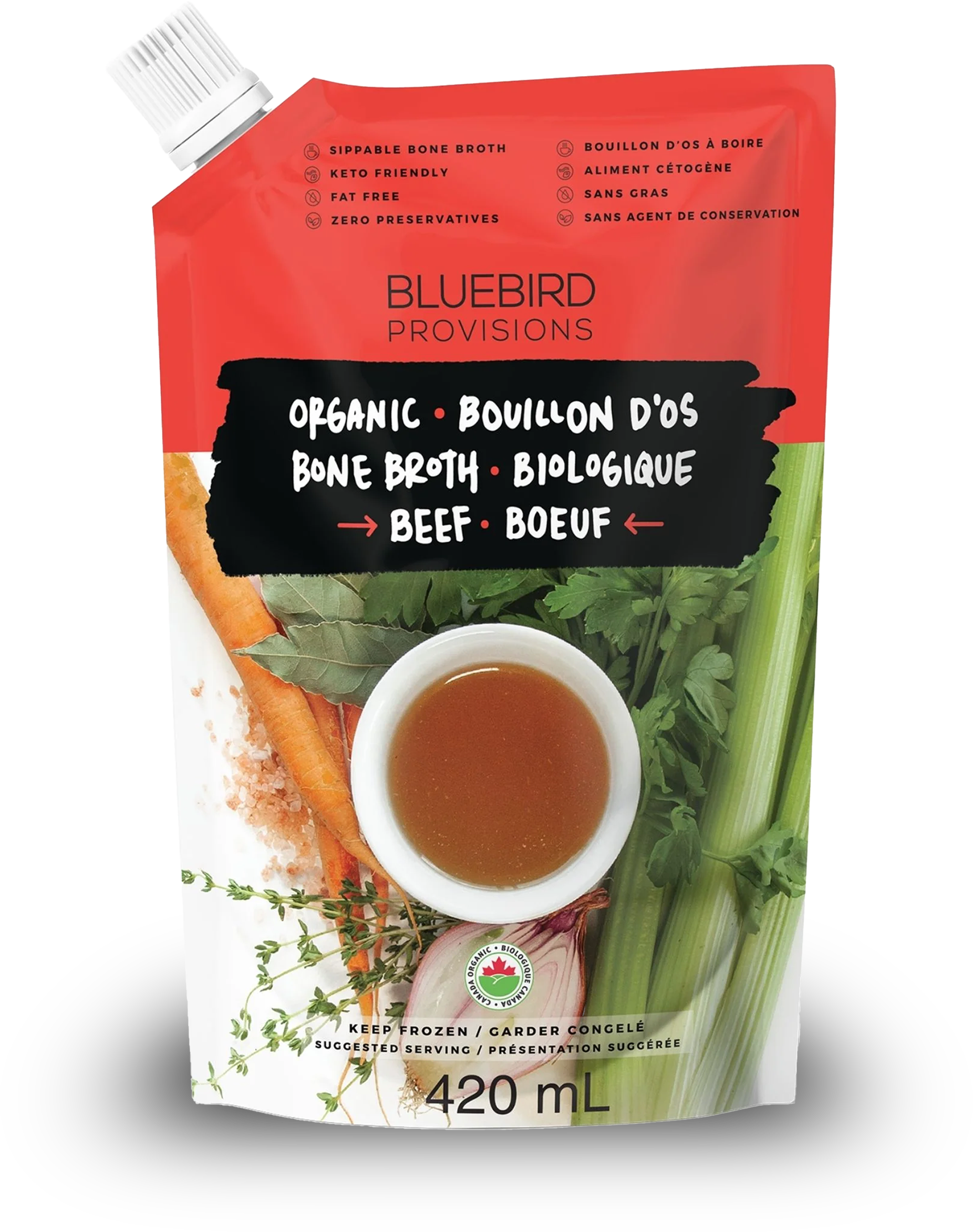


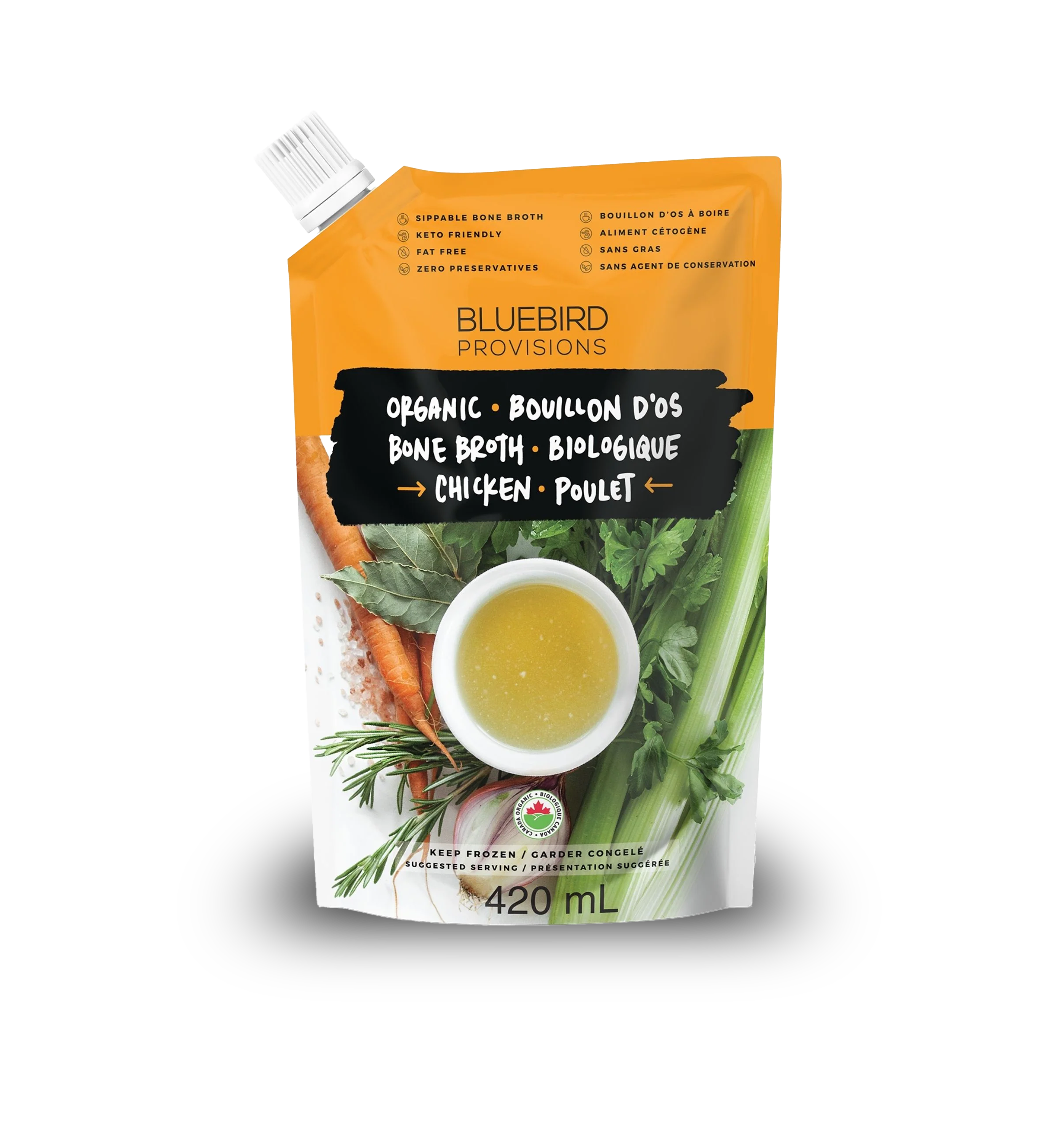
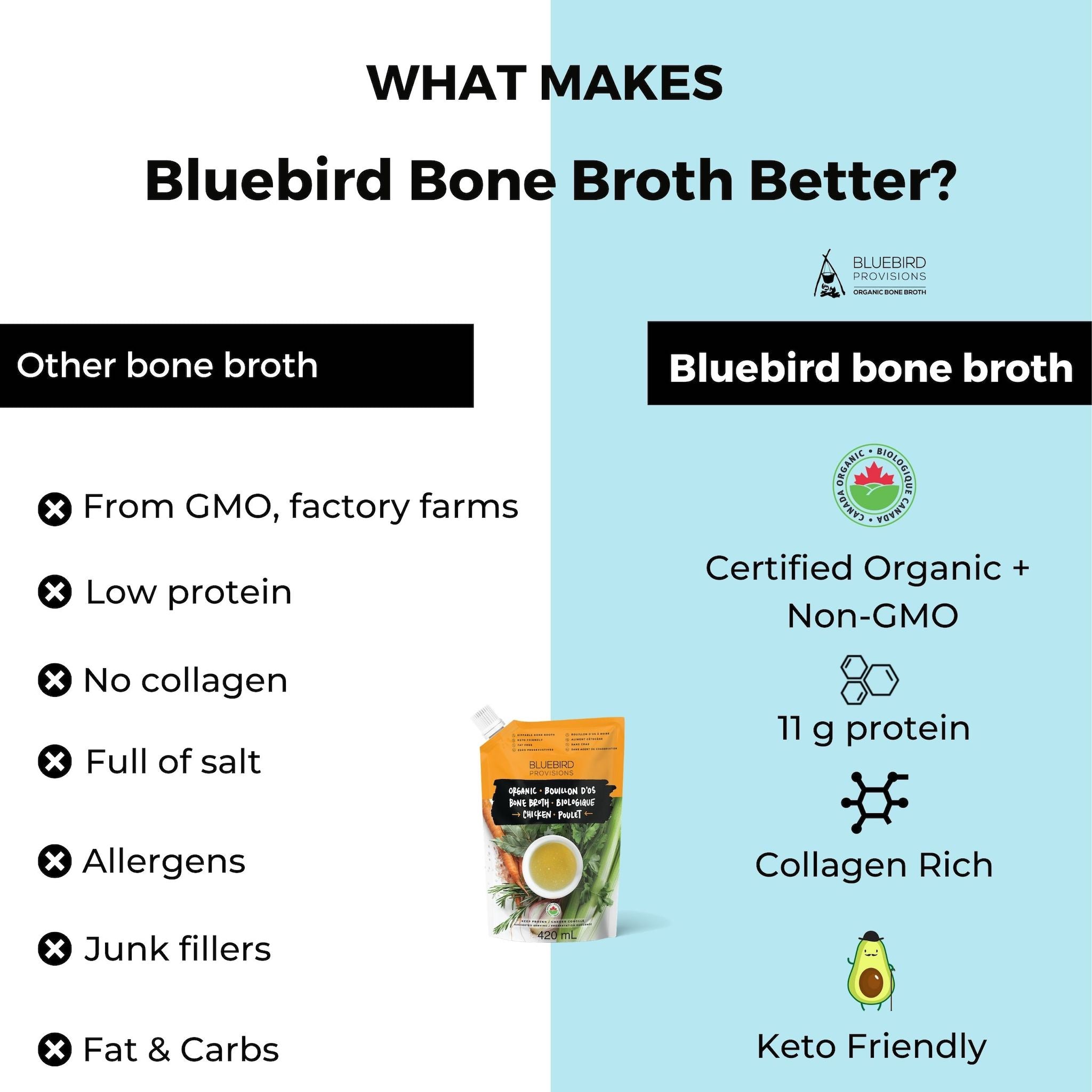
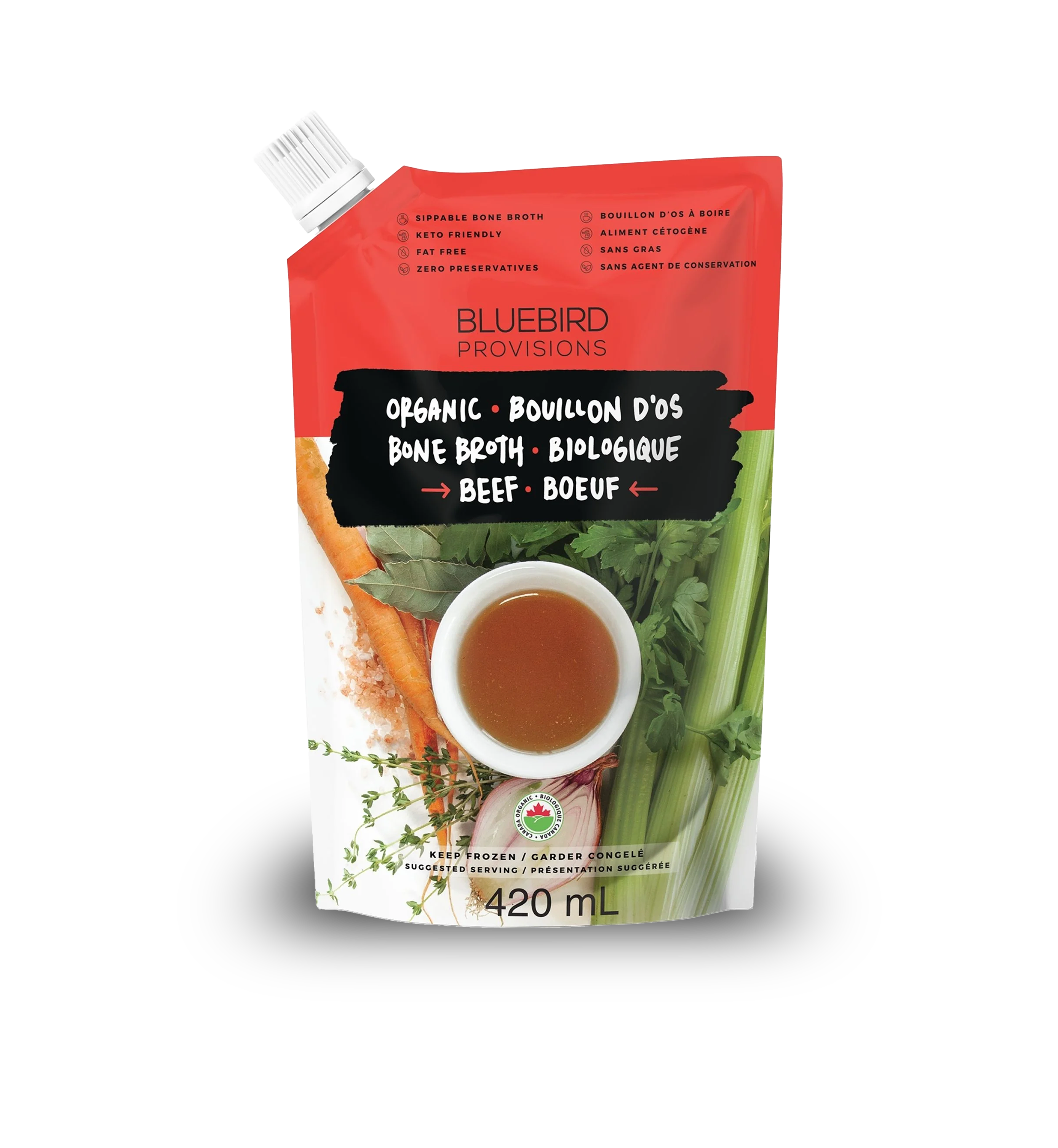
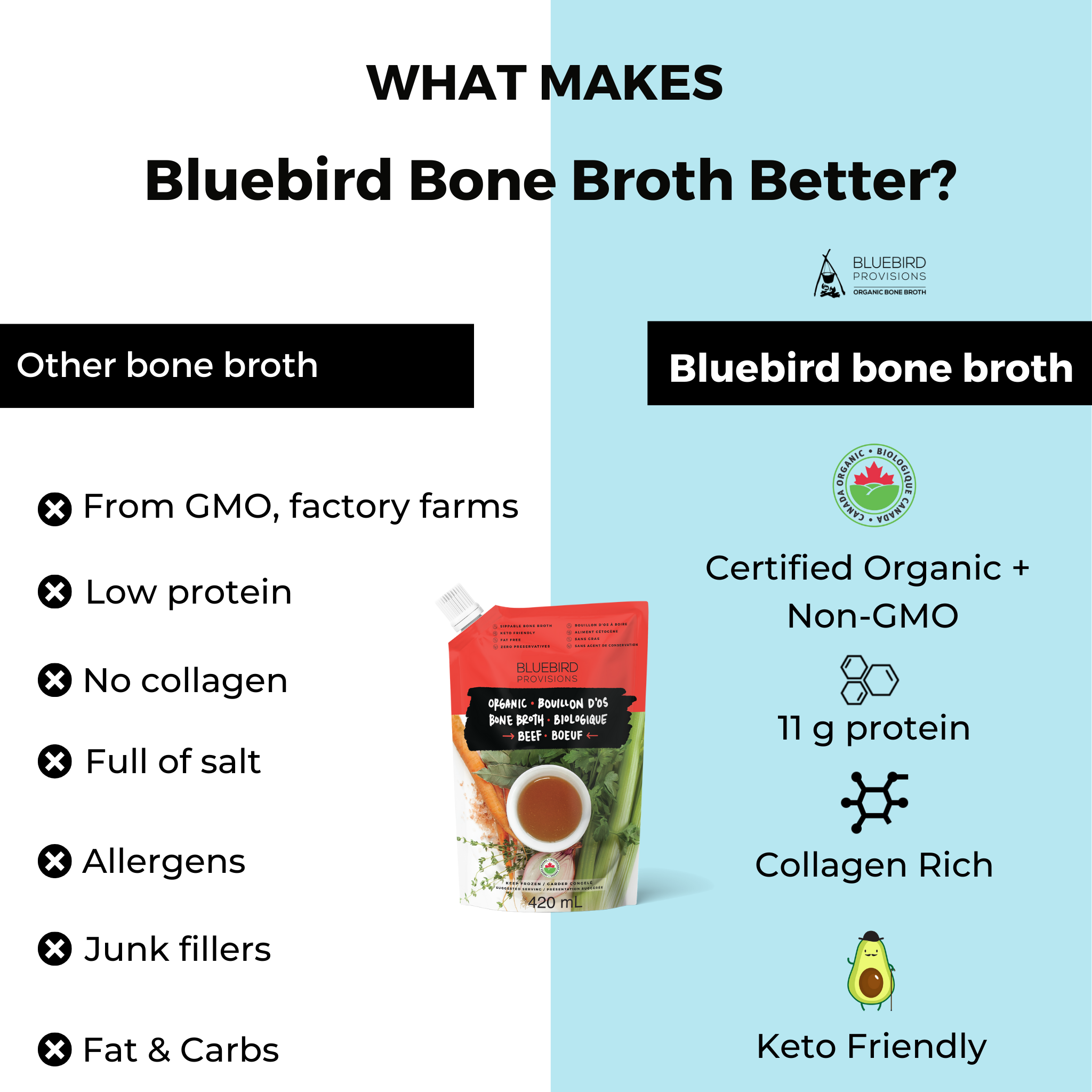
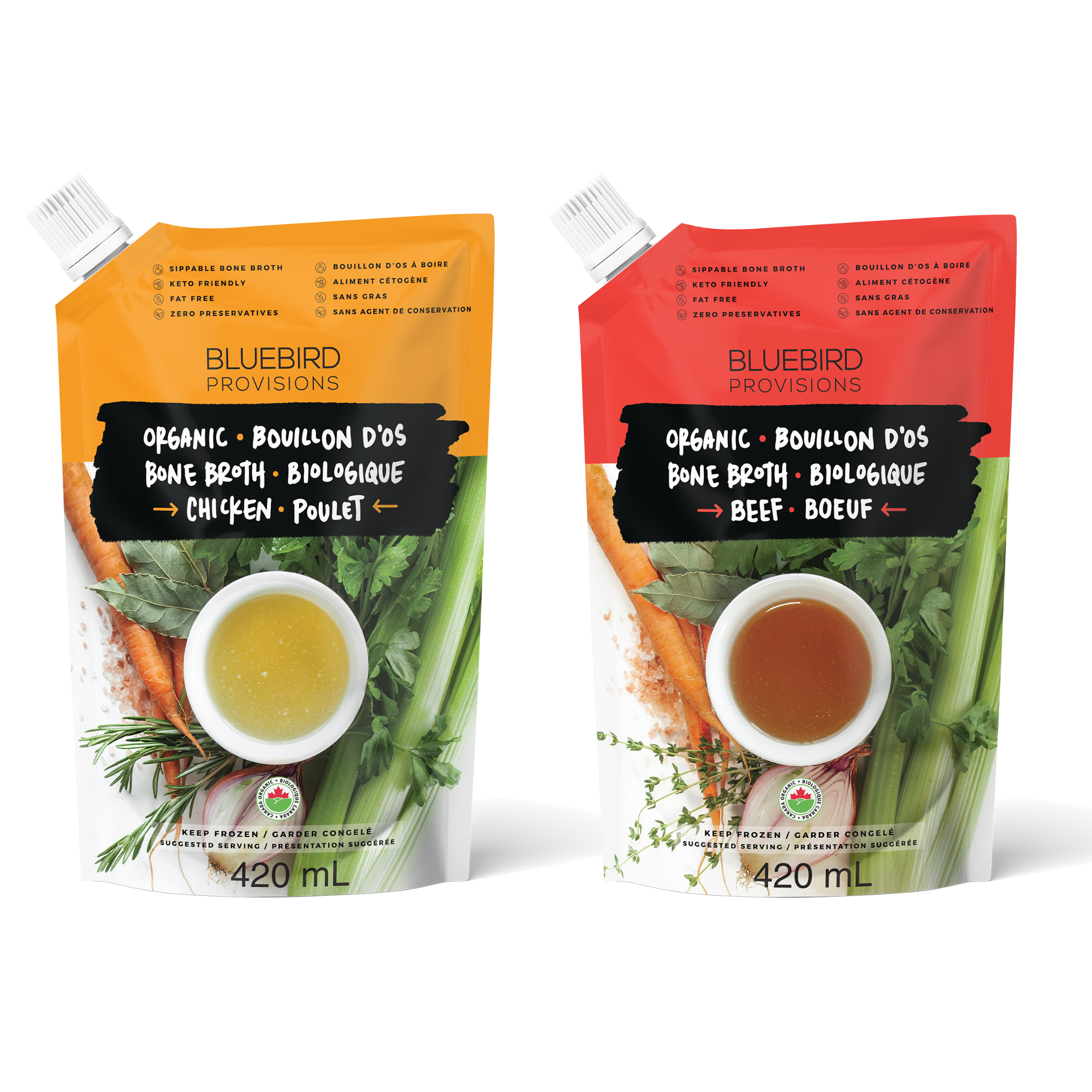

2 comments
Thanks for sharing Suzanne. Do you have a reference for where that quote came from? I can have a closer look.
Connor at Bluebird Provisions
I found this on line – "Crohn’s disease (CD) is a chronic progressive disease of the gastrointestinal tract characterised by transmural granulomatous inflammation and thickening of the bowel wall, with muscle layer overgrowth and collagenous fibrosis. Excess of fibrillar collagens occurs in all bowel wall layers.1,2 Recent findings suggest that increased collagen production may be pivotal in the mechanism leading to intestinal fibrosis, stricture development, and intestinal obstruction.3,4 Yet no medications effective against intestinal collagen accumulation are available, and surgery remains the main treatment for fibrosis related morbidity in CD.1 " According to your article collagen is good for my Crohn’s but the above statements scare me. Please let me know what you think? I take collagen every day and don’t know now if I should. ?
Suzanne McKinley
Leave a comment
This site is protected by hCaptcha and the hCaptcha Privacy Policy and Terms of Service apply.